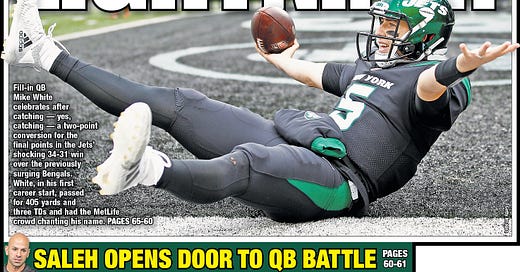The Quarterback Bubble
Nothing quite captures the state of the NFL’s quarterback economy like the ridiculous Mike White/Joe Flacco/Zach Wilson quarterback controversy unfolding in New York right now. In case you’re not super tuned into the affairs of the 2-7 Jets, they drafted Zach Wilson with the #2 overall pick this year. Wilson was supposed to be their quarterback of the future, but in his first six starts, the team went 1-5, and he threw nine interceptions against four touchdowns. His passer rating was 63.5.
Then he got hurt, and the team put in backup Mike White. White was a fifth-round pick in 2018 who had never taken a snap in a game before this—he’d been waived and signed to the team’s practice squad a half-dozen times in three seasons. But in his first start, White was amazing, going 37-for-45 with three touchdowns and 405 passing yards, and leading the Jets to their second win of the year, against a pretty good Bengals team. He played respectably at the start of the next game, too, before getting hurt in a game the Jets lost badly to the Colts.
You can see the makings of a fun story here: A heralded quarterback prospect gets injured, clearing the way for a nondescript career backup with the most boring name humanly possible to shine. And a lot of Jets fans talked themselves into the “Mike White experience” since he was such a blank slate and that fanbase is so desperate for good things to happen. But then White threw four interceptions against Buffalo, and Head Coach Robert Saleh named Joe Flacco the starter this week.
To most fans, it’s pretty clear what’s going on: Mike White may still be the best option the Jets have at quarterback, but the team clearly doesn’t believe in him long-term. And yet, if he continues to play semi-decently in Wilson’s absence, the team risks a quarterback controversy that could threaten the development of their #2 pick. So they’d rather go with Flacco, who hasn’t won a game as a starter since 2019; even if Flacco does put a couple good games together, he’s still a 36-years-old known for his mediocrity, so fans will probably not be convincing themselves he’s the quarterback of the future.
The problem is that Wilson is also probably not the quarterback of the future. More likely, he’s the latest iteration of Sam Darnold or Christian Hackenberg or Geno Smith or Mark Sanchez—a promising young quarterback the Jets tried but failed to make work. If this were limited to the Jets, you could just scoff at that sad franchise, but the issue in the NFL is that this is par for the course.
Indeed, it’s a cliché at this point to talk about how the NFL is a quarterback’s league. But it’s still depressing just how predictable that is. Indeed, every team in the league appears to be somewhere on the same development cycle:
There are a few teams built around veteran quarterbacks that were signed as free agents or acquired via trade, but that’s pretty rare, and often requires odd circumstances: The Buccaneers had to wait for New England to divorce Tom Brady; the Rams had to trade a king’s ransom for Matthew Stafford; the Titans seemed to have lucked into the emergence of Ryan Tannehill; etc. For the most teams, it’s simpler to just follow the formula.
The Jets are currently at the “Is he any good?” stage with Zach Wilson, and if he loses his job to a guy from Western Kentucky who couldn’t make it off the practice squad, then the answer would seem to be “No,” at which point they’d have to start all over again. Instead, they’re starting the non-threatening Joe Flacco, so they can stay in the “Then give him some time!” lane, along with the Browns and Baker Mayfield, the Dolphins and Tua Tagovailoá, the Giants and Daniel Jones, and a few others.
It’s really the same logic as any bubble. You simply buy whatever you can get cheaply, hold it for a while in the hopes that it goes up in value, convincing yourself and anyone who will listen that you’ve found the next big thing. If it pays off, then great; if not, you just cut your losses and move on to the next cheap thing. Of course, NFL teams try to develop quarterbacks, pairing them with the right coach or offensive scheme. But the draft rules and the rookie salary structure make it so easy to replace a quarterback that it’s often easier to just start from scratch with a new one. There is basically no penalty for failure—in fact, teams are rewarded for it. The Jets are just three years removed from drafting Sam Darnold with the #3 overall pick. The Arizona Cardinals traded the #10 overall pick after just one season because they had a chance to get Kyler Murray. The Eagles gave up on Carson Wentz just a few years after he made the Pro Bowl and helped lead them to a Super Bowl win because they drafted Jalen Hurts.
Normally the problem with a bubble is that it ends—the speculative frenzy sustaining them cannot go on forever, and someone is left holding the bag. But this bubble is bad in the moment. It’s a bummer for fans, who are caught in endless rebuilding cycles. And it sucks for the players, who commodified and discarded the minute a cheaper model comes on the market. Look out, Trevor Lawrence, you’re next…




